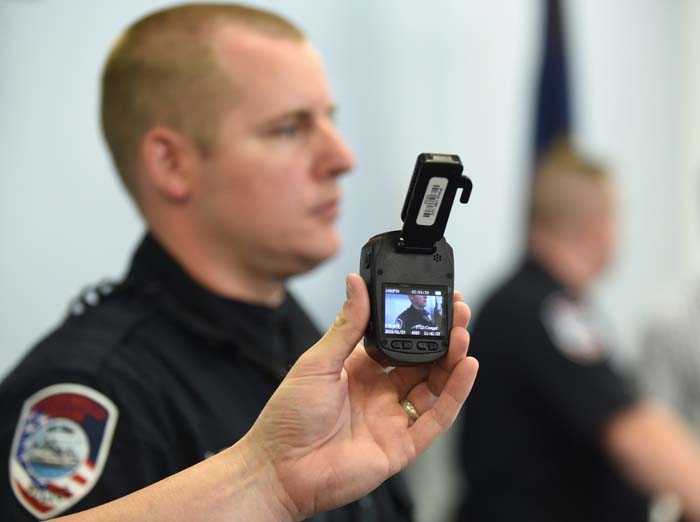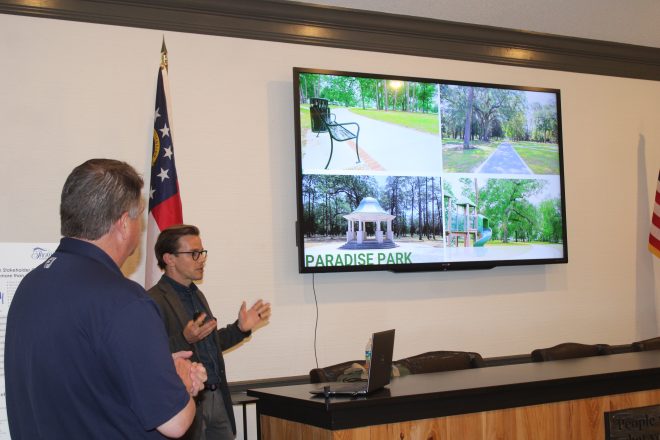Police body cams raise privacy concerns
Published 6:00 am Thursday, June 25, 2015

- Jeffersonville (Ind.) Police Cpl. Todd Wilson holds a body camera that his his department's police officers started wearing in May. The department started using the cameras before finalizing the policy on when the recordings will be released to the public.
INDIANAPOLIS – Body cameras are the vogue of law enforcement in response to high-profile incidents of police brutality throughout the country.
But even as the federal government hands out money to help local police invest, the technology meant to improve accountability is raising tough questions about how to use it, including who gets to see the recordings.
Less than a dozen local police agencies in Indiana equip officers with body cameras as part of an effort to improve trust with citizens, said Mike Ward, director of the Indiana Association of Chiefs of Police.
But the state has no uniform policy on how cameras should be used – including who may access recordings made by the cameras – leaving local officials to craft their own guidelines.
That includes deciding when to withhold footage from the public.
“We have a lot of questions that need to be addressed,” said West Lafayette Police Chief Jason Dombkowski, an early adopter of the body camera technology. “Right now, we’re in a gray area.”
Dombkowski calls body cameras “the future of law enforcement.” The U.S. Justice Department has promised $20 million in grants to help local police buy them.
But questions of control over video and audio recordings, concern about privacy for victims and bystanders, and worries about the cost of data storage remain unsettled.
“The technology has moved quicker than the systems we have in place,” said Dombkowski.
At least 10 states have passed laws dealing with cameras worn by law enforcement, with most limiting what recordings may be publicly released, according to the National Conference of State Legislatures.
In early June, South Carolina became the first state to require all police agencies to use body-worn cameras. Lawmakers exempted the footage from that state’s open records laws, citing privacy concerns.
The South Carolina law gives people who’ve been captured on video, along with criminal defendants and civil litigants, access to the footage. Police have discretion to release recordings to others, including the press.
Indiana lawmakers have yet to consider rules concerning police body cameras, but that may change with the 2016 session. Later this summer, a study committee will take up the issue, focusing on questions of public access and privacy.
“I’ve heard from a lot of police agencies looking for some guidance,” said Rep. John Price, R-Greenwood, who chairs the House Committee on Local Government. “They want their policies be consistent.”
Police chiefs, as well as advocates for civil liberties and press freedom, all say the state needs better guidelines.
“Nowadays everybody starts rolling their iPhone when police show up,” said Dombrowski. “But that kind of video often only shows a snapshot of the incident. A body camera on a police officer has the potential to tell the fuller story.”
When to tell that story may be a sticking point.
Dombrowski noted an incident in his community involving an allegation of police brutality. He said prosecutors have successfully argued against releasing a recording taken by an officer’s body camera, calling it evidence that is still part of ongoing potential litigation.
But Dombrowski argued the video would help shore up public confidence in his department’s work.
“We think the video speaks for itself,” he said.
Such questions confront police departments, big and small.
Jeffersonville started equipping its officers with body cameras this spring, before the department had settled on a public access policy.
Chief Kenny Kavanaugh at first said the videos generally would be available for public viewing, but now he’s reluctant to make that promise.
“Our city legal department is still looking at it,” he said.
Greensburg Chief Brendan Bridges plans to equip officers with body cameras by summer’s end.
He advocated for them as a means of making police work more transparent. But he’s been advised by attorneys to restrict public access to the videos until there’s better guidance from the state, he said.
Among his concerns are the costs of maintaining and analyzing what could be millions of hours of video footage, then having to decide what he may have to edit for privacy reasons.
“It’s very touchy issue,” he said. “The Legislature needs to steps in.”
In April, the American Civil Liberties Union joined with privacy advocates to urge lawmakers across the country to develop what ACLU Indiana director Jane Henegar calls “bright line” policies for use of the cameras.
They warned of the potential for over-surveillance of the public and the risk of unfairly profiling suspects using facial-recognition software. They also called for policies that prohibit officers from viewing footage from body cameras before filing police reports.
Their recommended guidelines also argue for making footage more widely available for public and media review, rather than keeping it solely under police control.
“We’d like to err on the side of transparency,” Henegar said. “If policies are sufficiently protective of privacy, then you’re going reduce a lot of risks of exposing too much.”
Maureen Hayden covers the Indiana Statehouse for CNHI’s newspapers and websites. Reach her at mhayden@cnhi.com. Follow her on Twitter @MaureenHayden.





